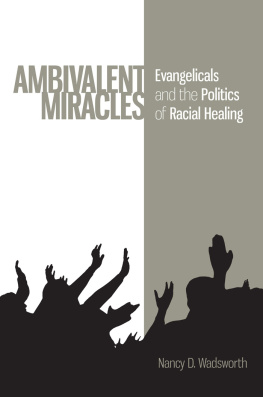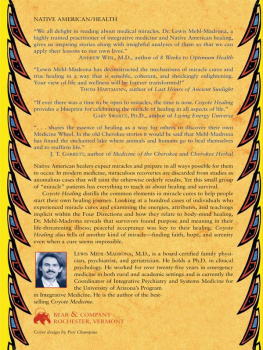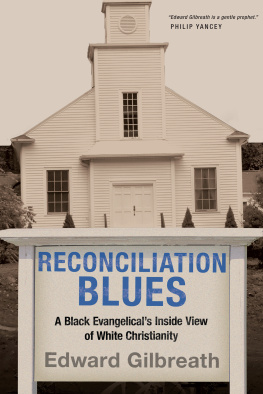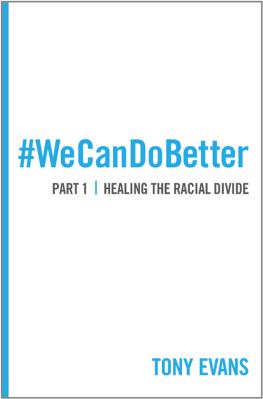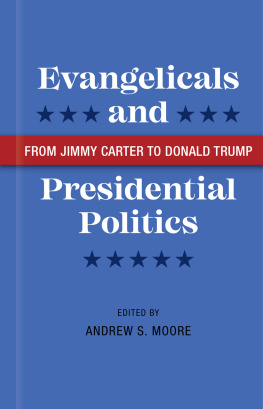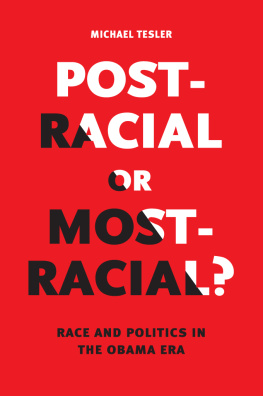Acknowledgments
In the time it took this book to find its true nature, three American presidencies, two wars, and several stages of my adulthood intervened. For a project with relatively modest ambitions, that is a lot of intellectual debt to accrue. While I am solely responsible for its shortcomings, this book has greatly benefited from the interventions of others.
Deep gratitude goes out to my mentors and graduate cohort at the New School for Social Research, where I first stumbled upon evangelical racial reconciliation efforts and decided to make them the subject of both a masters thesis and dissertation. With insight, encouragement, and humor, Victoria Hattam, Ira Katznelson, Jos Casanova, and especially David Plotke guided me through the tangles of investigating such an unstudied, culture-infused subject in political science. Thanks to my peers Kevin Bruyneel, Joseph Lowndes, Priscilla Yamin, Cat Celebrezze, Lori Hiris, Bonnie Thurston, Jenny Parker, and Joseph Luders, who read drafts at various stages, cheered me on, and made me feel like a fast, efficient writer. (Ha!) I may have been the first out, but Im the last one in, and your own accomplishments have been guiding stars.
The Carnegie Mellon Foundation provided a glorious postdoctoral fellowship at Cornell University from 2001 to 2003, where the project began to find a new framing at the intersection of race and religion in American political life. Thanks to Michael Jones-Correa, Kate Morris, Maria Fanis, the members of the faculty seminar on race and ethnicity in the United States, and especially the wise, tempered Richard Bensel for his mentorship. A decade later on the same campus, the School of Criticism and Theory provided six weeks of intellectual inspiration, and time to write the ending. Thanks especially to Hent De Vries and the students in his seminar on miracles, events, and effects. Our explorations brought me full circle on the subject of ambivalent miracles.
The University of Denver (DU) made possible the second wave of primary research, focused on the multiethnic church movement. Thanks to the committees of the DU PROF, Student Summer Research Scholarship, and Faculty Research Funds; Dean Anne McCall; the DU Salon Series; and the Department of Political Science. Arielle Finkelstein combed through three decades worth of Christianity Today and helped code the articles I analyzed. Jeffrey Satterwhite and Catlyn Keenan at the Iliff School of Theology were valuable graduate editors. To Tom Knecht, Seth Masket, Susan Sterett, Hava Gordon, Caryn Aviv, and Lisa Conant, all of whom helped my work along, I am most thankful and honored to be a part of this community.
The book would lack blood, spine, and spirit without the more than sixty people who generously shared their time, hopes, insights, and critiques with me over the course of my research. In particular, Beth, Anthony, Mark, and Jasonin your different ways, you went beyond the call of duty. I hope this work can begin to represent the complexity of the worlds you introduced me to. Your faith and passion inspire me.
Lisa Dale brought sanity, laughter, grim determination, and hundreds of hours in Denver coffee shops to the final drafting process. The sound of your feverish typing will always haunt me.
For the times I didnt think it would ever end and friends were islands of relief, I am also grateful to Jim Bouchard, Janine DAnniballe, Layla DeStaffany, Terry Freeman, Jessica Grant, Linda Kallinger, Javier Polr, Andria Marshall, Kris Grandpa Mattingly, Marcy Reiser, Jen Schneider, Wendy Shedd, Cl Symons, Katie Symons, and Dawn Weber. Thank you all for believing it would happen.
Anne Pogoriler, you are a brilliant editor, diagnoser of stylistic tics, and the real political scientist between us. I am so grateful for your generosity, patience, and love.
Introduction
This is a study of a growing, dynamic, increasingly influential, but little understood movement that has been unfolding in the last few decades within the diverse panoply of identities and faith-based organizations that is American evangelicalism. What I refer to here as evangelical racial change (ERC) advocates draw on core resources of their faith in hopes of conscientiously acknowledging a troubled past, repairing centuries-old wounds, and realizing a new, more multiracial present. They dream of transforming the segregated demographics of evangelicalism from the inside out, which means rethinking the social practices that built a racially fractured religious milieu. In this process, participants experience powerful epiphanies and social miracles, moments that transform and inspire.
Yet, puzzlingly, the movement as a whole is ambivalent about whether and how any of this should inform a politics: an explicit orientation toward the larger power configurations, policies, and party alliances in U.S. society that sculpt socioeconomic realities, including race, today. ERC advocates hope to create a Christianity faithful to what they see as New Testament principles honoring difference and diversity within the Body of Christ, and to influence the world in turn. But they are not sure that politics, as an individual or a coordinated collective response to race-related problems, is an appropriate expression of that conviction, even outside the church.
I argue that both the stunning breakthroughs this movement engenders and the curious boundaries it draws around itself are themselves products of a kind of cultural politics. Here I mean politics in the sense of the particular histories, social power dynamics, and institutional configurations that impact a given community or set of communities, which are, in turn, always in at least implicit dialogue with the larger world. Intragroup politics is situated in broader cultural contexts that constantly change. The politics of racial healing, in the evangelical case, is constructed at a crossroads where U.S. racial and religious history and the meaning-making practices of contemporary American conservative evangelicalism meet. That is a rich but fraught intersection. It teems with possibilities, including the potential for a new breed of multiracial evangelicalism to enter productively into larger national conversations about race and class in unprecedented ways. But it is also marked by anxieties about directly addressing broader power structures that impact participants livesanxieties that if not acknowledged and explored threaten to mute the movements reach, influence, and overall cohesion. To understand the movements emergence, its character, and its potential influence on American political life more broadly, we must become conversant with these complex dynamics.


